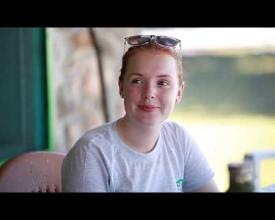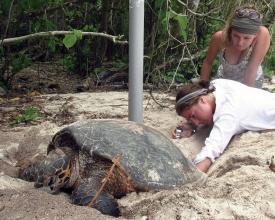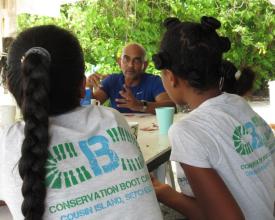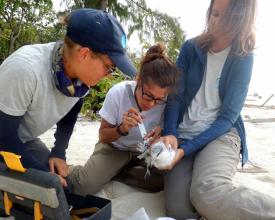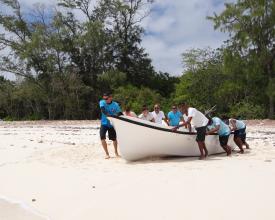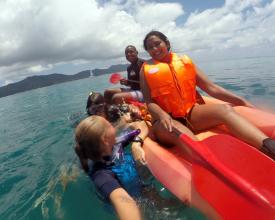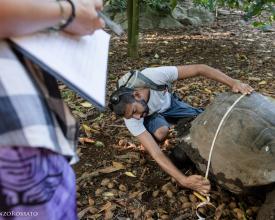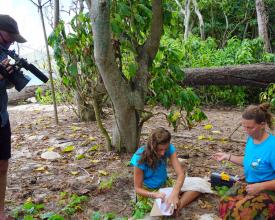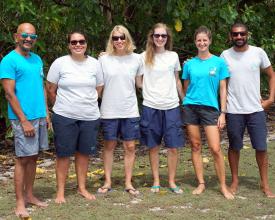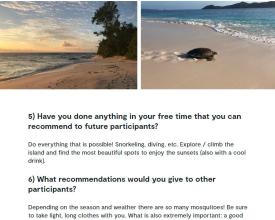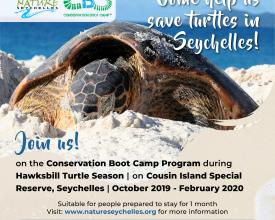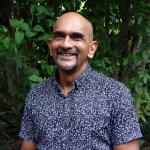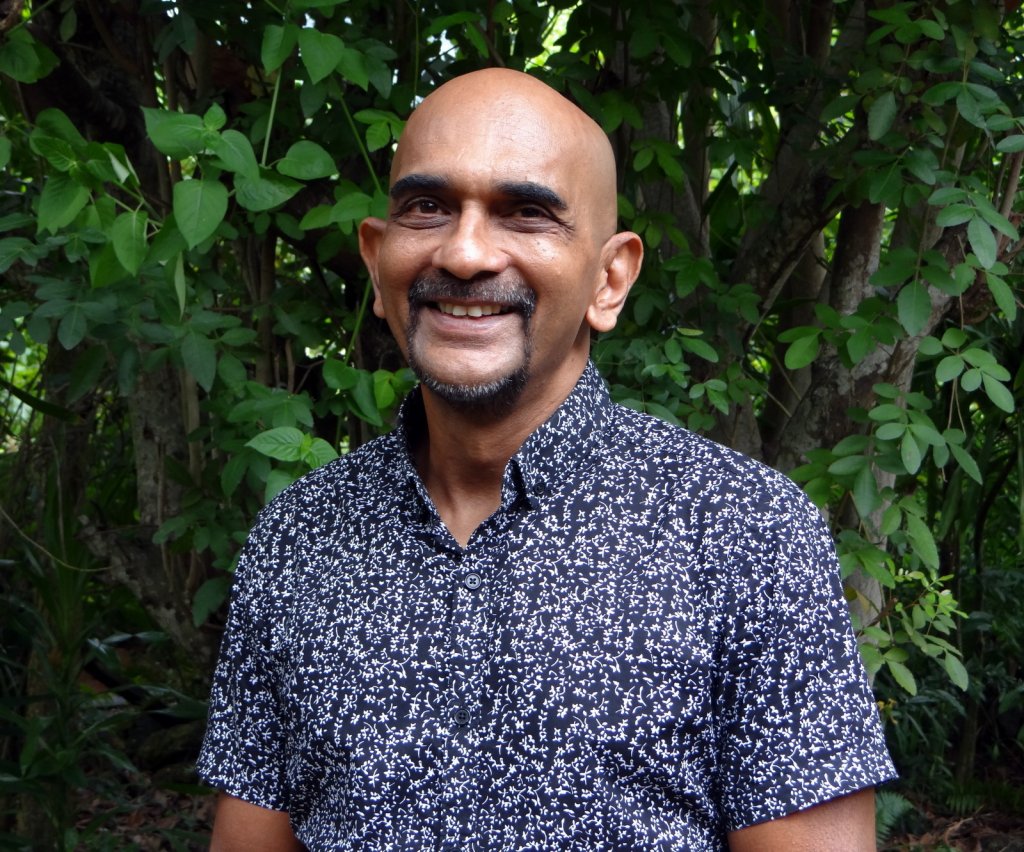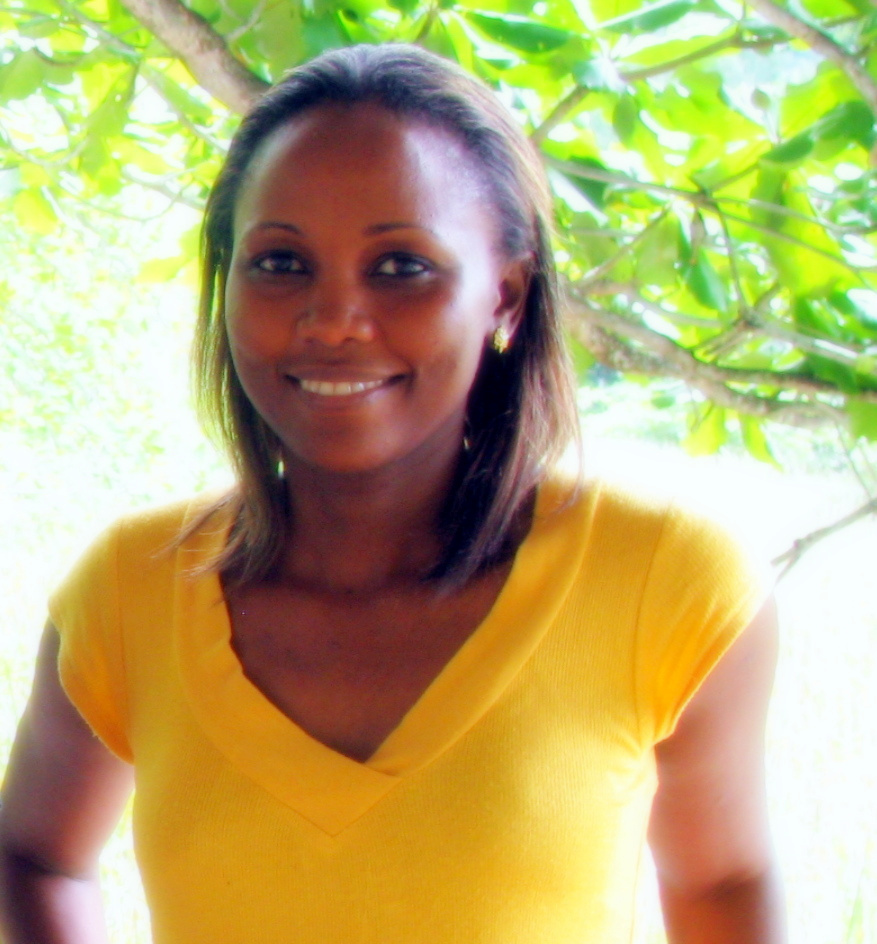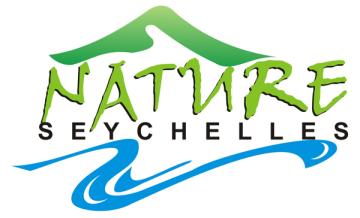
The World’s first Conservation Boot Camp
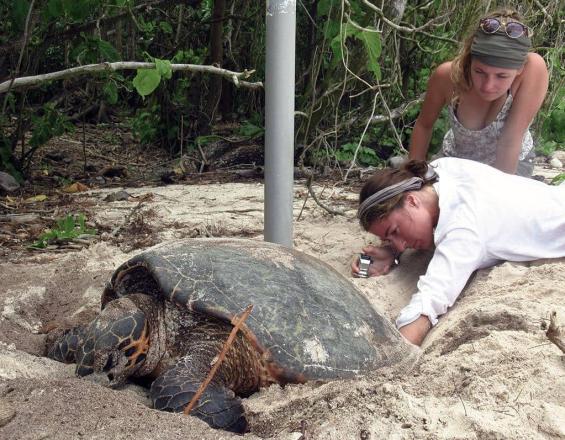
From May 2017 to September 2019, 72 young people from 23 different countries paid to participate in Nature Seychelles’ Conservation Boot Camp program. Designed to equip young people with real-life conservation skills, the program uses Cousin Island Special Reserve, Seychelles - a 50 year old conservation success - as a training laboratory. At the same time, the program acts as another sustainable funding mechanism for the protected area. It has been financially supported by GOS-UNDP-GEF Protected Area finance project from April 2016 to December 2019. The GEF project pays for a full time CBC Coordinator, some equipment and materials among other things.
Context
Challenges addressed
- Conservation has become an increasingly popular career choice for young people. But many organizations complain that young graduates don’t have the right attitude or the real-world skills to work in field-based conservation. Yet, there are not many places where you can get exposed quickly to both. This program tries to close this gap.
- The lack of sustainable and long-term finance mechanisms puts the conservation of key species and habitats in Cousin Island Reserve at risk.
Location
Process
Summary of the process
The Conservation Bootcamp - a paying program - was developed and piloted on Cousin Island Special Reserve with initial funding from the GEF. Placing agencies were contacted to recruit participants to the program. Media and marketing activities were conducted at both launch and implementation stages to publicise the program. As the program receives participants, their experiences were used to inform marketing.
Building Blocks
Develop a tool to test if young people will pay to learn conservation skills
1) Conservation has become an increasingly popular career choice for young people all over the world. But many conservation organizations complain that young graduates don’t have the right attitude or the real-word skills. Nature Seychelles created the Conservation Boot Camp (CBC) on Cousin Island Special Reserve to test if the island could be used as a laboratory to equip young people with conservation skills, while at the same time use the fees paid as a sustainable funding mechanism for the MPA. The program was financially supported by the GEF from April 2016 to December 2019. The GEF project pays for a full time CBC Coordinator, equipment, and materials and other. The coordinator manages the application process, and receives and integrates participants into the program. A conservation manager leads on conservation work, while the Chief Warden manages all the logistics. The CBC is exclusive and takes a maximum of 6 persons per session and takes place the whole year. Each session lasts for 4 weeks and costs Euro 1000.00 (not including airfares and food). A 2 week program was been introduced due to demand. Nature Seychelles is a Private Training and Educational Institution under Seychelles law and a Certificate of Completion is awarded at the end of the training.
Enabling factors
- Cousin Island Special Reserve - the 50 year old conservation success story - as a laboratory to test the program.
- Funding to support the initial implementation and testing of the program
- Nature Seychelles is a certified private training institution by law
- Leadership and mentorship from the CE who has over 35 years conservation experience
- Existing human resource to support the implementation
Lesson learned
- Initial funding is important as program depends on participants to fill all slots for it to be viable and sustainable. Not all slots were filled throughout the year.
- Having well-known successes provides credibility and helps in attracting participants.
- Necessary information laid out in a CBC handbook provided prior knowledge before sign up.
- One size doesn’t fit all - although targeted at people interested in conservation careers, some participants had no previous or post interest in conservation.
- Mentorship with well-known figure helps to boost confidence and catalyse conservation careers
- Program not able to attract participants throughout the year. Under review to improve numbers so that it remains viable after the GEF funding ends.
- The program was valuable for people from the region, in particular from Madagascar (18 participants), especially where there are not
exposed to conservation success stories.
Resources
Partnerships with placing agencies
Partnerships were established with 8 agencies specialized in placing paying volunteers for continuity beyond the GEF support. They were provided with marketing information, photos, and some received news and blogs for their websites. The partners have sent 21 participants to the program.
Enabling factors
- Existence of agencies specialised in placing paying volunteers with whom partnerships could be formed.
- Buy-in and collaboration between the agencies and Nature Seychelles
- A wide selection of agencies catering for different markets and languages
Lesson learned
- Agencies helped to place a percentage of the participants.
- Recruitment and administrative tasks take up a significant amount of time, and human resource has to be allocated to carry them out.
- In addition to agencies, word of mouth and referrals work well, therefore the program experience has to be optimal.
Resources
Media and Marketing
Nature Seychelles marketed the program through placing agencies websites, paid social media ads, own websites, online magazine, and mass media through local and international newspapers, magazines and Television. Two in-house marketing videos have been produced. Information boards targeted at tourists have been erected on the island; wardens who lead the tours use them to explain the program. The program is under review and an integrated business and marketing plan rooted in the realities and practicalities of Cousin Island and Seychelles, with the ultimate goal of attracting more participants to this immersive conservation experience, is being developed.
Enabling factors
- Core staff with exeprience in media and marketing
- Existing assets such as websites, blogs and social media platforms for targeted marketing
- Funding for paid advertising and for media and publicity materials production.
Lesson learned
- While marketing has been partially successful, Nature Seychelles does not believe it's reaching its customer base for the program. A review of current and previous marketing efforts and related results is underway.
Impacts
72 young conservationists from 23 countries have received transferable conservation training, through learning by doing, in endangered species monitoring and censusing, ecotourism and protected area management. They have contributed 3840 volunteer hours to the conservation of Cousin Island, equivalent to 480 working days. 7 issues of the Conservation Boot Camp magazine have been published, with 1708 reads and 8453 impressions on issuu.com, to share stories and personal impact from the participants. Marketing through paid social media ads, websites and through placing agents resulted in 190 people applying.
Beneficiaries
- Young graduates from Seychelles and the world
- Nature Seychelles: additional funding mechanism & through the contribution of manpower for conservation of the MPA
- Seychelles through the conservation of biodiversity
- Tour operators who benefit from the MPA
Sustainable Development Goals
Story
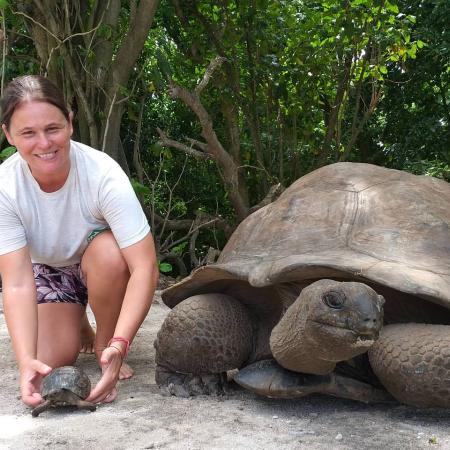
Late in 2018, I stumbled upon the Nature Seychelles website and decided to do the 1 month Conservation Boot Camp program.
The average day involved getting up early, having a cup of coffee and then out to do beach patrolling – looking for any signs or tracks of possible hawksbill or green turtles which might have come ashore to lay their eggs. Then back at base, make communal breakfast, head to the visitor shelter where we would assist in ecotourism. Other duties varied on some days, from doing sea bird breeding success monitoring, Seychelles magpie robin monitoring, beach profiling, invasive species control to name a few. On off time we would snorkel, relax on the beach or just socialize on the patio of the research centre.
The work was really physical; we were exhausted the first week, but thereafter, we got used to the fast paced-long hours and the humidity of the Seychelles. Of course it helps that the setting is the gorgeous Cousin Island.
We were a small group -- from Germany, Switzerland, Austria, Australia, UK and South Africa -- which made the experience much more enjoyable and personal.
The staff were easy to get along with. I found it interesting chatting to wardens from Seychelles about their passions for their home and conservation. It was also insightful to interact with the Science Coordinator and CBC Coordinator.
Before doing the Program, I was working in middle management in nature conservation and protected area management in the South African Environmental Sector for the last 19+ years, so I initially thought it would be challenging to go back to do internship work.
I have learnt so much about myself in the process, in terms of being in a close social environment with new people and sharing your personal space, being able to work with people from different backgrounds, being able to get along with far less facilities, and being able to still learn new skills and have new ideas - even after being established in your career.
I honestly believe the skills and knowledge I have learnt with Nature Seychelles, will come in handy in my career, either back home or abroad.
I would definitely recommend anyone to go do the Conservation Boot Camp Program with Nature Seychelles! Whether you are fresh out of School, University, or settled in your career.
Louise de Roubaix, CBC Participant, South Africa

